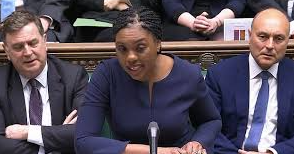Prime Minister Faces Criticism for Not Threatening Retaliation Against US Import Levies
Prime Minister Sir Keir Starmer has warned that escalating trade tensions with the United States would benefit no one, as former President Donald Trump prepares to introduce a series of tariffs targeting the UK and other nations.
Speaking at Prime Minister’s Questions, Starmer defended his government’s decision not to threaten retaliatory measures, contrasting his stance with the more aggressive responses from the European Union and other affected countries.
A Measured Response Amid Rising Pressure
“We have been preparing for all possible outcomes ahead of today’s expected tariff announcement,” Starmer told MPs. “Let me be clear—no one wins in a trade war. The British people deserve a calm and pragmatic approach, which is exactly what we will deliver.”
His government, he added, is engaged in ongoing discussions with Washington in pursuit of a broader economic agreement that could help mitigate the impact of the tariffs. However, Starmer’s refusal to consider immediate countermeasures has drawn criticism from political opponents.
Opposition Voices Demand Tougher Stance
Conservative leader Kemi Badenoch accused Starmer of implementing policies that had left the economy vulnerable at a critical moment. Meanwhile, Liberal Democrat leader Sir Ed Davey called for the creation of an international economic coalition to push back against Trump’s tariffs.
Others have gone further, accusing the Prime Minister of weakness in the face of US pressure. Former Marks & Spencer chairman Lord Rose criticised the government’s strategy, likening it to “waiting with a begging bowl,” hoping that Trump’s personal ties to the UK would spare Britain from harsher measures.
Economic Consequences Loom
The UK has sought exemptions from the tariffs, but negotiations have so far been unsuccessful. Some reports indicate that Britain may face lower import duties than the European Union, but concerns remain over the potential economic fallout.
Analysts warn that the tariffs could have serious consequences. The Office for Budget Responsibility has cautioned that US duties might erode Chancellor Rachel Reeves’s fiscal flexibility, possibly necessitating tax hikes or spending cuts. Additionally, the Institute for Public Policy Research estimates that a 25% tariff on UK car exports could jeopardise 25,000 jobs and destabilise the nation’s automotive sector.
What Comes Next?
Trump is expected to formally announce the tariffs at a White House event at 9pm UK time, referring to the move as “liberation day.” In response, Education Secretary Bridget Phillipson acknowledged that while negotiations are ongoing, the UK is entering a difficult period.
“The economic impact of these tariffs will be significant,” Phillipson admitted, warning of potential repercussions for businesses and public finances. Some speculate that a trade deal with the US could involve adjustments to Britain’s digital services tax—a levy on large American tech firms—in exchange for relief from certain tariffs.
With economic uncertainty ahead, pressure is mounting on the Prime Minister to prove that his diplomatic strategy can protect British industries while maintaining stability in transatlantic relations.

